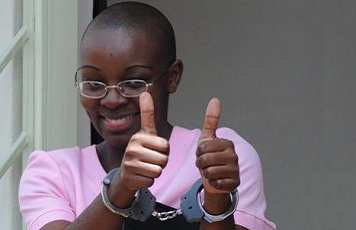The Historic Role of Rwanda’s Victoire Ingabire Umuhoza. Designing a Common Front against Paul Kagame

Victoire Ingabire was born in Rwanda in 1968, is an economist and mother of 3 children. She leads the opposition party to the dictatorship of her home country, the Unified Democratic Forces (FDU-Inkingi) since 2006. Violence in the African Great Lakes region prevented her return to Rwanda from the Netherlands and remained exiled since 1994 to 2010.
Her courage and concerns led her to create various organizations for the promotion of human and women’s rights. She was a founding member of various civil society initiatives in the Netherlands as an NGO CODAC (whose objective is to morally, legally and materially support exiled persons from the Great Lakes region and create spaces for coexistence and relationship through sport and culture); URAHO NGO (gathers Rwandan women living in the Netherlands and helps them integrate into their new environment, takes care of orphans and asylum procedures); PROJUSTITIA FUNDACIÓ RWANDA (fight for justice for all victims of the Rwandan tragedy); HARAMBE (platform of associations of African women committed to promotion and development in the Netherlands). In addition, she is a member of the board of ZWALU (platform of women’s associations fighting for their emancipation).
Among the actions that bear their mark, the conference in Amsterdam (2004) that brought together all political organizations and all representative structures of civil society in the African Great Lakes region should be highlighted. Along the same lines, in 2005 she promoted a series of meetings between Rwandan civil society organizations and opposition organizations to design a common front against Paul Kagame, the current Rwandan president accused of crimes against humanity.
Since its inception, Ingabire is committed to the Inter-Rwandan Dialogue (DIR) that has been developing over ten editions, held in locations such as El Masnou, (Barcelona), Palma de Mallorca, Amsterdam (Netherlands), Washignton (USA) or Kinshasa (DR Congo). She has actively participated in the Barcelona edition, facilitated by Aequitas-Center for Mediation and Peaceful Conflict Resolution, under the auspices of Adolfo Pérez-Esquivel, Nobel Peace Prize. She promoted and participated in the women’s edition held in El Masnou (2008) as well as in the one held in Mallorca (2009). Ingabire advocates the role of women in the peace and reconciliation processes to heal the aftermath of the Rwandan genocides.
In 2010, Ingabire returned to Rwanda to run for presidential elections. Upon arrival, she appealed for the recognition of all the victims and asked the perpetrators of the massacres to report to the courts. The Kigali government accused her of treason and denial of genocide and was imprisoned. After a trial without guarantees – condemned by Human Rights Watch and the European Commission – she was sentenced to 15 years in prison. Her case was seen in the African Court of Human Rights, who in November 2017 acknowledged that Ingabire had not had a fair trial in Rwanda and demanded that the Rwandan government release it and repair the damage caused to its person within a period of 6 months from the date of the trial. The Court ruled that Ingabire had not denied or minimized the genocide and that her criticism of the government should have been allowed under the freedom of expression that Rwandan justice observes. President Paul Kagame pardoned her in September 2018 but has not taken any reparation measures.
During the first months of imprisonment in Kigali, Ingabire wrote a book in which she recounts her return to Rwanda, the trial and her subsequent imprisonment as well as her thoughts and convictions. We reproduce below some quotes from the Spanish version of Rwanda. Between the four walls of the 1930 (Ediciones Trabe, Oviedo 2016):
“I decide to return to my beloved homeland, not out of ambition, but out of conviction […] We must work alongside those who seek to end the cycles of violence that have always accompanied the struggle for power in Rwanda.”
“I come for peace and it is this peace that will guide my political action to eradicate injustice and to break all the chains that are imprisoning us.”
“We want a peaceful liberation, without a new bloodshed.”
“Wake up, give up fear and let us free peacefully. Together we will win! ”
Victoire Ingabire, known as the “Rwandan Mandela” is not allowed to incur the elections nor can any opposition party. The current president fulfills his fifth term, and modified the constitution to perpetuate himself in power. We believe that Ingabire deserves international public recognition and we are convinced that the award would contribute to honoring their struggle, to persevere in their cause, to protect their integrity and that of their alliance. Making your case visible would open up new possibilities for reconciliation and peace reconstruction of a new Rwanda and would be a relevant example for other open peace processes. It would also give hope to the Rwandan groups that remain in exile in Europe and America.
Her link with Spain was born with the action of justice presented by associations before the National Court for crimes against humanity that include victims such as Quim Vallmajó, and eight other cooperators and missionaries. The relationship is deepened with the celebration in El Masnou and Mallorca of two editions of the Inter-Rwandan Dialogue facilitated by Spanish entities. We believe that the fight against impunity and the search for objective truth are fundamental to lay the foundations for reconciliation and the contribution of peace, objectives for which Victoire Ingabire has committed politically but also personally.
*
Note to readers: please click the share buttons above or below. Forward this article to your email lists. Crosspost on your blog site, internet forums. etc.
Featured image is from Friends of Victoire website

